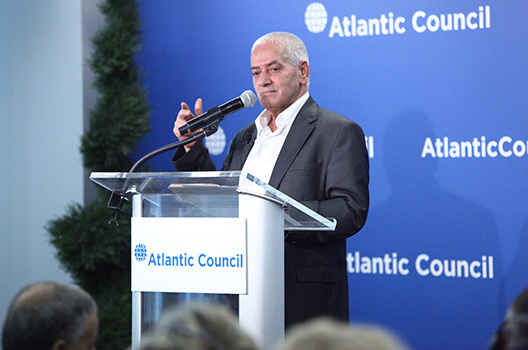 On October 9, 2015 the Norwegian Nobel Prize Committee announced the Tunisian National Dialogue Quartet as winner of the 2015 Nobel Peace Prize. Less than one month later, the Rafik Hariri Center for the Middle East was honored to host Nobel Prize co-winner Hussein Abassi, head of the Tunisian General Labor Union (Union Générale Tunisienne du Travails, UGTT). Senior Advisor to the Secretary of State Ambassador Kristie Kenney and former President of the Republic of Slovenia H.E. Danilo Türk joined the Council in welcoming Abassi and celebrating Tunisia’s achievements.
On October 9, 2015 the Norwegian Nobel Prize Committee announced the Tunisian National Dialogue Quartet as winner of the 2015 Nobel Peace Prize. Less than one month later, the Rafik Hariri Center for the Middle East was honored to host Nobel Prize co-winner Hussein Abassi, head of the Tunisian General Labor Union (Union Générale Tunisienne du Travails, UGTT). Senior Advisor to the Secretary of State Ambassador Kristie Kenney and former President of the Republic of Slovenia H.E. Danilo Türk joined the Council in welcoming Abassi and celebrating Tunisia’s achievements.
In her introductory remarks, Ambassador Kenney applauded Tunisia for the way its citizens stepped up when the transition faced severe challenges. This, she said, is “a sign and a signal” for the world, and we can see in Tunisia’s example the role that the citizen and civil society should play in the life of every democratic nation. Former President Danilo Türk in his introduction of Abassi highlighted the labor union’s efforts to improve the situation of workers and decrease unemployment, and mentioned the joint work that his organization, the Global Fairness Initiative, has undertaken in cooperation with the UGTT.
Abassi began his address with a brief history of the UGTT and its role in Tunisia. Since the organization’s founding in 1946, the UGTT has been a force of political activism as well as an advocate for workers in Tunisia. Abassi said this history set the state for the UGTT to take a leading role in 2013 when Tunisia faced a severe political crisis. The UGTT stepped up in response to this crisis and joined with three other civil society organizations to bring Tunisia’s political parties to the table in a National Dialogue Conference. Through the National Dialogue Conference, the Quartet of civil society organizations led Tunisia to an agreement that allowed for a peaceful transfer of power and one of the most progressive democratic constitutions in the region.
The Norwegian Nobel Committee acknowledged the achievement of the Quartet with the Nobel Peace Prize, and Abassi said this recognition sends a message to the world. First, it highlights the importance of labor unions and trade unions not only as social advocates but also as a balancing element in societies. It is also a message to all civil society forces around the world that they truly can play a significant role in establishing democracy. In return, Abassi said, countries around the world must leave space for civil society and labor unions in order to maintain strong national unity and stability. “Our message to the world,” he said, “is that social stability is the basis for security.”
Lastly, Abassi asked that the world not forget about Tunisia. Even with the great success of the national dialogue, Tunisia needs economic support from its friends. Without support, Tunisia will not continue to be a positive model for the region; and if the Tunisian experiment fails, he said, the consequences will be “unbearable” for the Middle East and the rest of the world.
Webcast – English Version:
Webcast – Arabic Version:
